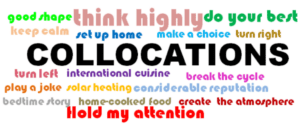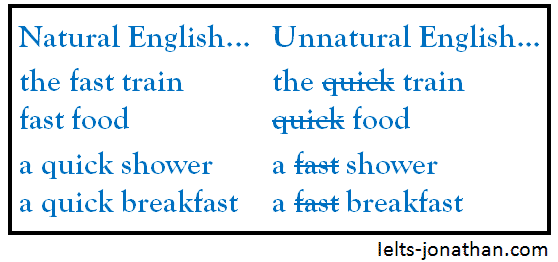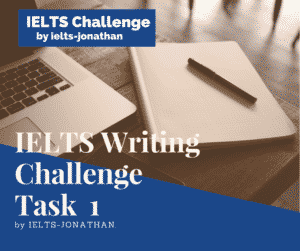Common Collocations are basically vocabulary
In this post, I’ve put a few short lists of common collocations to give you more of an idea about them and why they’re important in IELTS.
First of all, a good learner’s dictionary will show collocations associated with specific words.
There are also dictionaries of collocations, though these are more difficult to find.
Guess what, You already use collocations everyday!
Here are the most basic examples.
Verb collocations
Have + drink, a bath , a rest
Do + business, nothing, your best
Make + a noise, progress, trouble
What is a collocation?
A collocation is two or more words that are often found together.
These combinations just sound “correct” or “right” to native English speakers, who use them all the time.
However, in other combinations they may be unnatural and just sound “odd”, “wrong” or “incorrect.”
Look at these examples:
Why learn collocations?
You might question why you should consider learning collocations for IELTS.
There are some quick answers to this…
- Your language will be more natural and more easily understood.
- You will have alternative and richer ways of expressing yourself.
- It is easier for our minds to remember and use language in chunks or blocks rather than as single words.
How to learn collocations
- Be aware of collocations, and try to recognise them when you see or hear them.
- Treat collocations as single blocks of language. Think of them as individual chunks, and learn strongly support, not strongly + support.
- When you learn a new word, write down other words that collocate with it (learn well, learn easily, learn by heart, learn with difficulty).
- Reading is an excellent way to learn vocabulary and collocations in context and naturally. Read as much as possible!
- Practice using new collocations in context as soon as possible after learning them. Revise what you learn regularly.
- Learn collocations in groups that work for you. You could learn them by topic (time, number, weather, money, family) or by a particular word (take action, take a chance, take an exam).
- You can find information on collocations in any good learner’s dictionary such as Cambridge’s Online Dictionary
Types of collocation
There are several different types of collocation made from combinations of verb, noun, adjective etc. Some of the most common types are:
Sample Collocations
There are several different types of collocation. Collocations can be adjective + adverb, noun + noun, verb + noun and so on. Below you can see seven main types of collocation in sample sentences.
- adverb + adjective
- Invading that country was an utterly stupid thing to do.
- We entered a richly decorated room.
- Are you fully aware of the implications?
- adjective + noun
- The doctor advised regular exercise.
- The Titanic sank on its maiden voyage.
- He lay on the ground in excruciating pain.
- noun + noun
- Let’s give the cast a round of applause.
- The ceasefire agreement came into effect yesterday.
- I need two bars of soap please.
- noun + verb
- The lion roared when it heard the dog bark.
- Snow was falling as our plane took off.
- The bomb went off accidentally.
- verb + noun
- The prisoner was hanged for committing murder.
- I do my homework in the morning, after making my bed.
- He gave a presentation about his work.
- verb + expression with preposition
- We returned home because we had ran out of money.
- Her eyes filled with horror, and then she burst into tears.
- Their behaviour was enough to drive anybody to distraction.
- verb + adverb
- He placed his hands gently on her shoulder.
- Mary whispered softly in John’s ear.
- I vaguely remember what happened.
Advanced Collocations
Here are some definitions to help you understand the term collocation:
- to collocate (verb): to appear with another word more frequently than by chance – The word “white” collocates with “coffee”.
- collocation (noun): the combination of two or more words more frequently than by chance – Learning about collocation helps us speak more fluent English.
- a collocation (noun): an example of collocation – “White coffee” is a collocation.
A simple way to remember the meaning of collocation is to think of “co-” (together) and “location” (place) = place together, locate together, go together
Other meanings of collocation are (in this sense they are not related to language)
- collocate (verb): place side by side or in relation
- collocation (noun): the action of placing things side by side or in position
- collocate/co-locate (verb): share a location or facility with someone or something
Strong and weak collocation
Not only do the words “go together” but there is predictability in their association.
Often, in any collocation, one word will “produce” another word in the mind of a native speaker.
Simply put, if I give you one word, you can predict the other word, with degrees of success.
This predictability is not 100%, but it is always much higher than with non-collocates.
Therefore, we have ‘Strong’ and ‘Weak’ collocations.
The predictability may be strong: for example “wish” collocates with very few words, as in:
- make a wish
- grant a wish
- express a wish
Or the predictability may be weak: for example, “circuit” collocates with more than 8 words, as in:
racing, lecture, short, closed, printed + Circuit
Circuit + board, training , board
and ‘big’ collocates with hundreds
Big + apartment, beach, car, camera, chance,
disappointment, fight, gun, lamp, moon, news,
ocean, pain, pity, price, queue, table, umbrella,
upset, wait, window
Lexical and grammatical collocations
For an advanced learner and teachers a distinction can be made between lexical collocations and grammatical collocations.
Lexical collocations are a type of construction where a verb, noun, adjective or adverb forms a predictable connection with another word, as in:
- adverb + adjective: totally sad(NOT
completelysad) - adjective + noun: terrible pain (NOT
terriblejoy) - noun + verb: lions roar (NOT lions
shout) - verb + noun: commit suicide (NOT
undertakesuicide)
Grammatical collocations are a type of construction where for example a verb or adjective is followed by a particular preposition, or a noun is followed by a particular form of the verb, as in:
- verb + preposition: depend on (NOT depend
of) - adjective + preposition: afraid of (NOT afraid
at) - noun + particular form of verb: strength to lift it (not strength
lifting it)
When is a collocation NOT a collocation?
Linguists often disagree over this question however in teaching EFL it is common to say that if a sequence of words is 100% predictable with no room for change except in the tense, they aren’t collocations but fixed expressions , such as(“spick and span” “prim and proper”) or idioms (“hit the sack” “on the ball”).
Finally, a good dictionary to explore collocations is the Cambridge Dictionary for Students of English.
You can go over to my Facebook page and join other students who are working towards the test and join my IELTS WRITING TASK 1 group for free practice.
All the Best, Jonathan
I’m Jonathan
I’ve taught IELTS and University English in more than a dozen universities and schools around the world.
I’m a parent, traveller and passionate about language teaching and helping students achieve their dreams.
Whilst living in Austria or working in Asia, I run IELTS courses to help students get to where they want to be.
If you are serious about IELTS, connect with me to see how I can help you.








Was this helpful? Leave a comment :)